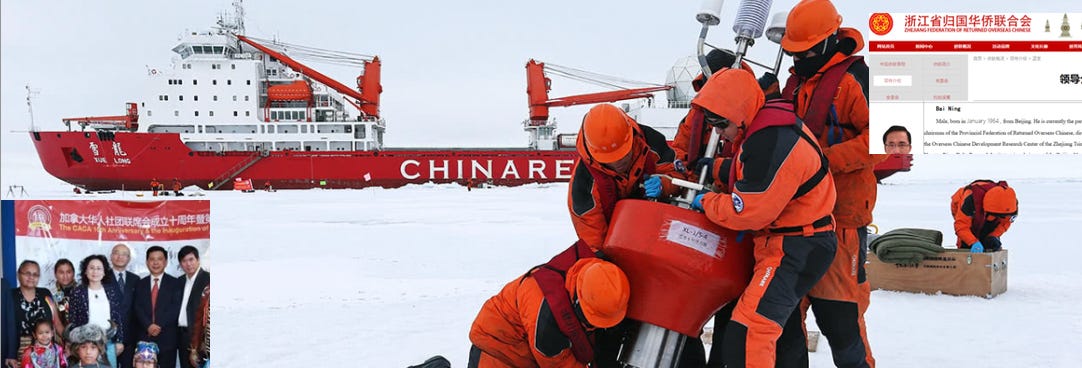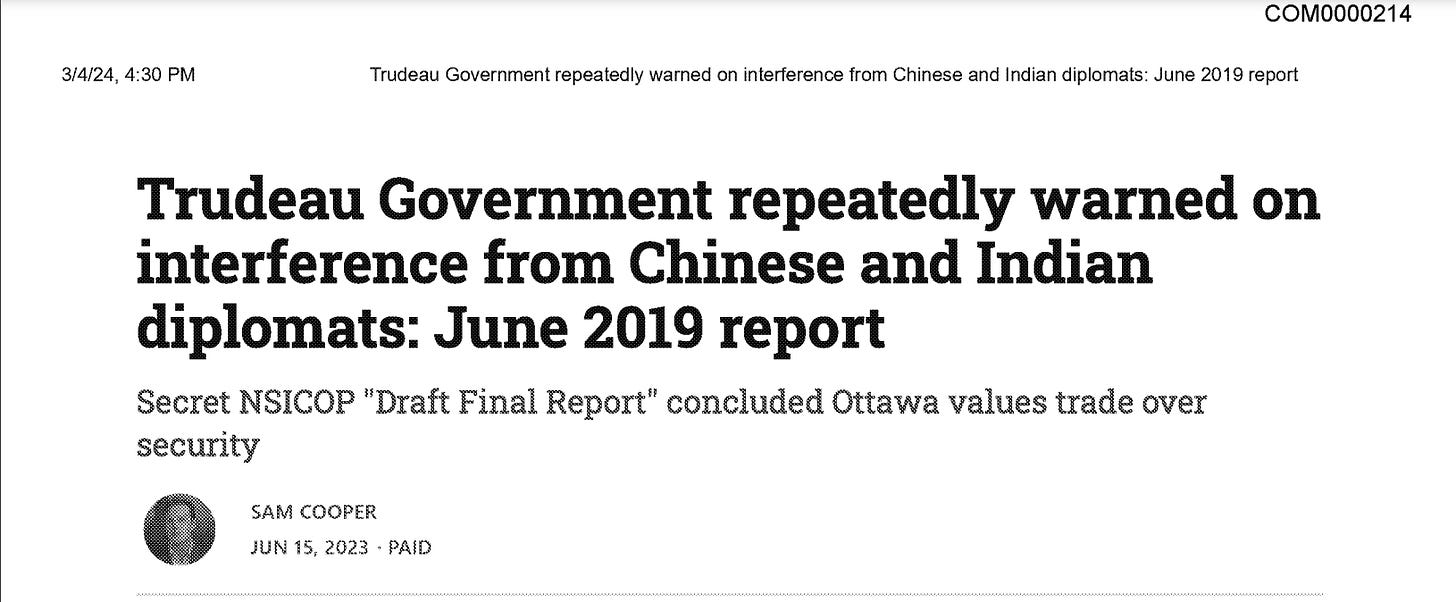China clandestinely targeting First Nations leaders to procure Canada's natural resources: NSICOP
The Bureau's analysis of NSICOP's Top Secret 2019 report points to Chinese threat networks across Canada and politicians likely named in NSICOP's bombshell 2024 review

Beijing is targeting Canada’s First Nations leaders with intelligence operations based on tourism that are aimed at securing Aboriginal-controlled natural resources, a Top Secret report from Ottawa’s intelligence-review watchdog NSICOP says.
Additionally, Beijing funded a British Columbia provincial candidate and its Consul General in Vancouver took actions to cover up the candidate’s “possible Chinese Communist Party membership,” NSICOP’s June 2019 draft report alleges.
The Bureau exclusively obtained NSICOP’s unredacted, 2019 report on foreign interference, which details China’s pervasive operations to bribe, coerce and co-opt Canadian leaders at all levels of government.
The national security and intelligence body made up of Parliamentarians was little known to most Canadians before it exploded into the spotlight in June, publishing a highly redacted report alleging unidentified MPs and Senators in Ottawa have been colluding with China.
NSICOP was tasked to review allegations on China’s election interference that only surfaced due to Canadian media reports based on intelligence leaks.
While The Bureau has previously reported on NSICOP’s 2019 report in a story tabled as evidence in Ottawa’s Foreign Interference Commission, a new analysis of the report’s unreported intelligence and most consequential allegations should shed light on the scope of NSICOP’s 2024 report, which is based on related CSIS investigations and intelligence holdings.
It’s also believed prominent cases from NSICOP’s 2019 report involve some of the elected officials and Chinese proxies implicated in NSICOP’s 2024 report.
But Canada’s problems with politicians allegedly benefiting from China’s support and in turn secretly using their offices for Beijing go far beyond the federal officials that NSICOP 2024 deals with.
“Many of the same tactics used to target elected officials at the federal level are replicated with provincial, municipal, and indigenous officials,” the June 2019 NSICOP report obtained by The Bureau says.
“Provincial, municipal and indigenous governments wield important power in areas that are of interest to hostile foreign states. CSIS assesses that subnational orders of government are soft targets for foreign interference activities.”
Canada’s Aboriginal leaders — and the tension between federal and First Nations jurisdictions over natural resources in northern Canada — are an unexplored aspect of the Chinese interference story.
But the 2019 NSICOP report demonstrates crucial national security issues at stake.
It suggests Beijing is seeking clandestine relationships with First Nations leaders under false pretences in order to control Canada’s strategic resources in areas of increasing geopolitical importance.
“In late 2011, China invited a national-level group of Aboriginal leaders to travel to China. A CSIS assessment noted that the invitation was advertised as an opportunity to develop tourism for First Nations,” NSICOP’s report says.
“According to a Minister Counsellor at the PRC Embassy, the tourism opportunity was merely “beipian” (Mandarin for ‘to be fooled’) and that the true intention of the invitation was to pursue Aboriginal-controlled natural resources.”
The report continues, saying that Chinese intelligence conducted research into every First Nations leader that joined the junket before they arrived in China.
“The PRC conducted research on each delegate in part to identify their ‘potential usefulness’ to the PRC,” the report says. “The Minister Counsellor concluded that “Chiefs are ‘blind’ when dealing with the PRC and have no interest in knowing more.”
In an interview Charles Burton, a sinologist and former Canadian diplomat, said “the idea of making friends with Aboriginal people for Chinese strategic purposes, would be part and parcel of their overall agenda to get access to the Canadian north and the natural resources that are there.”
“China would be fully aware of the Aboriginal leaders that have permissions to give exploitation of resources,” Burton said. “But we don’t know to what extent gifts or benefits may have been given to the Aboriginal people from the Chinese regime.”
More generally, NSICOP’s 2019 report says China’s deep interference in Canada expanded significantly, “following Xi Jinping's election as general Secretary of the CCP in 2012.”
It says China’s party-state implements “a multifaceted approach to carry out its foreign interference activities in Canada by leveraging its numerous government and non-government actors who use overt and covert approaches, including bribery, censorship, coercion, and co-optation to exert influence.”
Some of NSICOP’s most stunning cases demonstrate that wealthy Chinese community leaders take direction from Chinese diplomats to fund Beijing’s favoured election candidates in municipal and provincial governments.
“A candidate in British Columbia's 2013 provincial election reportedly received funding from the PRC. The PRC Consul General in Vancouver was reportedly ‘actively coordinating attendance of community leaders/potential donors at a campaign event,’” the 2019 NSICOP report says.
“Additionally, the Consul General tried to protect the PRC from public controversy related to the candidate's possible Chinese Communist Party membership,” it continues, attributing the case to a May 2016 report from CSIS.
While the candidate in question isn’t named, more than one elected official in British Columbia is believed to have familial ties to Chinese Communist Party officials. And the concern could extend across Canada, Charles Burton believes.
“This is shocking,” the former diplomat said in an interview.
“I’m not aware of this case, but I think a lot of people that have come to Canada and have been successful in the Chinese regime, are party members. And Beijing can leverage them, because I think it’s difficult to end your membership.”
“So the idea that there could be candidates for provincial office that are members of the CCP, is very likely,” he continued. “The idea they would be used by the United Front as sleeper agents, even if they wanted to become part of Canada’s mainstream political life, that is very difficult to escape.”
Most NSICOP 2019 cases appear to relate to areas around Toronto and Vancouver, population centres of Canada with many municipal and regional councils in addition to provincial legislatures that are targeted by Chinese influence operations.
In another case, “several PRC businessmen contributed to a mayoralty campaign instead of planned donations to a hospital, given that the ‘investment return on such a donation would be greater,’” NSICOP’s 2019 report says.





